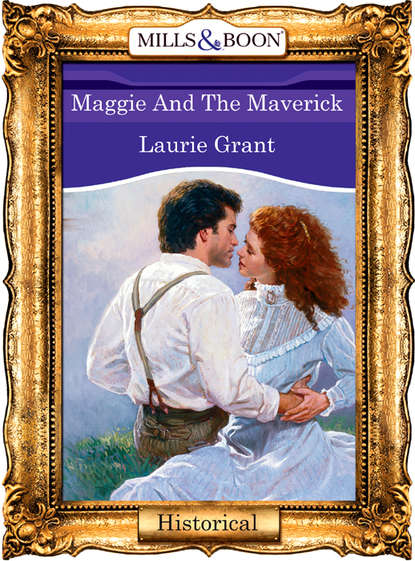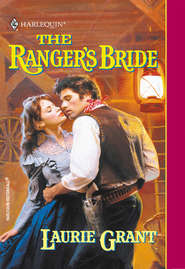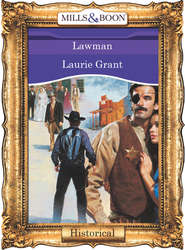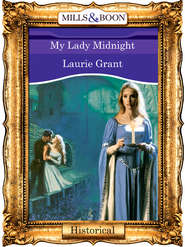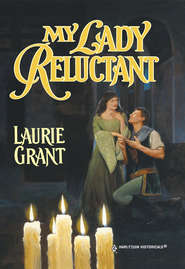По всем вопросам обращайтесь на: info@litportal.ru
(©) 2003-2024.
✖
Maggie And The Maverick
Настройки чтения
Размер шрифта
Высота строк
Поля
His brothers exchanged glances, saying nothing.
“Mama isn’t gonna be happy about lettin’ Johnny go away,” Sam said at last. “She’s awful fond a’ the little feller already.”
“So am I,” Garrick said, and realized it was true. “But I’ll bring him home to visit often enough. Once Mercy has her baby, Ma won’t mind so much.”
“Sure, why not? If you can write those fiery letters to the editor, you can write newspaper articles,” Cal said, obviously warming to the idea. “And just think, every week you could write an editorial and criticize—or praise—any ol’ thing you wanted.”
Garrick thought getting to express his opinion in print, in his official capacity as editor, sounded very fine indeed. Then he had a disturbing thought. “But I don’t know anything about running a printing press.”
“Well, you could learn, I reckon,” Caleb assured him. “You could hire someone who’s worked on a paper, and get ‘em to teach you. You’d be the editor and write the articles, and he’d run the press.”
“But what about Johnny? I have a responsibility now,” Garrick reminded himself aloud.
“Shoot, I imagine Livy’d be willing to lend you her housekeeper,” Cal said. “Senora Mendez is always complaining we don’t give her enough to do, and asking us to have a baby real quick so she’ll have somethin’ to keep her busy.”
“You are tryin’ to comply with that command, aren’t you, brother?” Sam inquired, his face the picture of innocence.
Cal grinned. “Maybe.”
Garrick watched his brothers, suddenly envious of their happiness. Both of them had found a good woman to marry. That avenue seemed closed to him, however. Even if Cecilia had entered a bigamous marriage, he wasn’t free to marry again—and even if he were, what woman would marry a man with a wooden leg?
Resolutely he shut his mind to the idea of a woman’s love and focused on the rising excitement he felt about the idea of starting a newspaper. He was ready for a change. He’d been sitting around the farm for too long as it was. If he didn’t try something new, he’d just become an old man before his time, and Johnny would grow up smothered by his grandmother and his aunt, who, with the best intentions in the world, cossetted the boy too much.
“All right, ask that Mendez woman if she’ll be my housekeeper. I’m going to do it, boys. I’m going to start a newspaper in Gillespie Springs. You reckon you could find a house for me there?”
Sam let out a rebel yell that had the women running from the kitchen to see what was the matter, and Cal clapped him on the back. “I’m sure of it, brother,” Cal said.
“Gillespie Springs!” the stagecoach driver sang out, as he reined in his team in front of the Gillespie Springs Hotel.
Maggie Harper sighed with relief. The jolting, swaying ride, which was supposed to have taken only a couple of days, had taken three and a half, thanks to the spring rains. The roads between Austin and Gillespie Springs were a quagmire. Torrential downpours had delayed their start two mornings out of the three, and at least twice each day the driver and the men in the coach had had to push the coach out of muddy ruts.
Once, a flash of lightning had struck a nearby tree, which terrified the team and caused them to gallop on in a runaway panic. They had gone a full two miles before the driver could rein them in, and Maggie had been sure that at any moment the coach would hit a bump, tilt and crash onto its side, crushing its hapless occupants.
Afterward, to amuse herself as the tedious, muddy miles rolled by, she’d composed a newspaper article in her head as if the worst had happened. The headline read: Stagecoach Overturns—Famous Female Journalist Tragically Perishes Before Her Time.
The red-faced woman in black bombazine sitting across from her glared in her direction. Belatedly, Maggie realized she had been smiling. The journey hadn’t been enjoyable, but the rain had finally stopped, the sun was shining and they had at last arrived in Gillespie Springs.
Mrs. Red Face was just one of the fellow travelers Maggie wouldn’t be sorry to bid farewell to. The coach was filled to capacity with two rotund drummers who had a fondness for foul-smelling cigars, an anxious mother holding a teething, fretful baby, and Maggie—and of course Mrs. Red Face, who had surely uttered a complaint for every mile that passed.
Every fifteen miles the coach had stopped to change teams, but it was usually raining too hard for Maggie to get out and stretch her legs. Every fifty miles they’d halted for a longer time, so the passengers could eat, drink and relieve themselves, but the stations were crude and dirty and the food was hardly fit for consumption.
The coach creaked to a stop, and after Maggie descended, the driver lifted her bag down to her.
“Thank you, sir. I hope the last leg of your trip goes smoothly,” Maggie said.
“You’re welcome, Miz Harper. You’d better get up on the boardwalk yonder before those boots’re soaked through,” the driver said, pointing to the mud that squished up to her ankles. “Ain’t ya got someone meeting ya here?” “Oh, someone’s expecting me, sir, don’t worry. I just have to find my way to the newspaper office.”
A small town, Gillespie Springs nevertheless had a prosperous look on this sunny April morning. Next to the hotel on her right, Maggie could see signs announcing a millinery and a barbershop. When she turned to look to her left, she saw a bank, a doctor’s office, a general store, and across the street from those buildings, the saloon, the jail, a telegraph office and the livery. So where was the newspaper office? Then she noticed the small, new-looking building right across the street.
She narrowed her eyes to read the sign swinging in the breeze beneath the new building’s overhanging roof. “The Gillespie Springs Gazette, Established 1869,” she read aloud. Yes, this was it. The ad in the newspaper seeking an experienced pressman, or printing press operator, had mentioned that the venture was a new one. When she had written offering her services, Garrick Devlin, the editor, had responded with flattering speed.
Of course, Devlin might not have done so had she signed her letter with “Margaret Louise Harper” rather than “M. L. Harper.” Pangs of guilt had assailed her all the way from Austin, but she knew she had to find a way to leave there, and if misleading a prospective employer about her sex would secure her a job in another town more quickly, then mislead she would. Surely once she told Mr. Devlin why she was every bit as qualified as a male printer, he’d give her the chance to prove herself.
Garrick Devlin. She’d formed a picture of him in her mind. With a name like that, he must be an older man, probably in his fifties, with a balding head and spectacles perched on his nose. He’d have a plump, comfortable wife and a brood of grown or nearly grown children. Perhaps he’d already be a grandfather, and if so, no doubt he’d be a doting one. He might be skeptical of hiring a woman, but she’d tell him about her experience. Why, she’d started as a printer’s devil for her father, a veteran newspaperman, back in Ohio, and progressed to the point that when they got to Austin she’d been John Harper’s most-relied-upon reporter.
Devlin had to accept her! She just couldn’t go back to Austin! She’d rather die than face the knowing looks, the sneers, or the attentions of the officers and officials of the Freedmen’s Bureau, who suddenly seemed to find her irresistible—ever since Richard Burke had left her house that night.
Of course he had boasted of his conquest. She’d known it the very next week, when she’d gone with her father to a New Year’s Eve ball put on by the army for its staff and the rest of the Northeners who now lived in Texas. She’d seen the ladies whispering behind gloved hands in corners, staring in her direction, only to fall silent when she approached. They were distant and vague when she tried to converse with them, and some even looked right through her and walked away with an angry swish of skirts—as if she were a saloon girl who’d dared to trespass where only ladies were welcome!
Her dance card had been full that night, though, a fact that only seemed to make the officers’ wives and daughters hate her more. But she could take no joy in being the belle of the ball, for it was achingly clear that the men who danced with her were only looking to sample the delights Captain Burke had told them about.
Of course her sudden change in popularity—a belle on the dance floor, a pariah among women—could not escape her father’s attention, even as absentminded and preoccupied as James Harper could be at the best of times. She’d had to tell him what had happened between herself and Captain Burke. It was only the second time she’d ever seen her father cry; the first time had been when her mother had died. He hadn’t condemned Maggie, though. He’d been so kind and loving that she’d felt worse than ever.
She didn’t have to worry about him doing any violence to Burke—though he’d expressed a fervent desire to hurt him—because the captain had suddenly and conveniently been “called to Washington” two days after his last meeting with Maggie.
Maggie knew she’d been fortunate beyond measure when her “monthly visitor” came as usual two weeks after Burke’s departure, for she could imagine no hell worse than having to carry the fruit of her foolish liaison. Now they could put this unfortunate happening behind them, her father had told her, and things could go back to normal.
James Harper had protested when she’d told him she had to leave Austin. Things would blow over, he’d said—but she knew they would not. Her position there was untenable. Even though she was willing to forgo what social life there was for Yankees in Texas, and just live for her work, she could no longer endure her father’s pitying kindness in the midst of her disgrace.
Maggie couldn’t tell him that, of course. She’d told him she needed a change of scene, to try her wings. He’d been adamantly against her going off alone to take a position, but she had reminded him she was an adult with some limited funds of her own, and in the end he had given her his reluctant blessing.
Now she took a deep breath and began to wade through the ankle-deep mud that separated the newspaper office from the hotel.
Chapter Three (#ulink_bba5a30a-c3ff-510b-ba70-6f0e3082c212)
Garrick leaned over the shiny black Washington handpress that held pride of place in the middle of the office of the Gazette, holding on to the sides of the machinery as if it were a raft in the midst of a stormy sea.
Perhaps it was a mistake to have come in today, one day after his solemn-faced brother Sam had brought over the letter from Houston. Full of misspelled words and barely legible writing, the letter had been written by a semiliterate friend of Martha Purdy, the woman who had brought little Johnny to him. She thought he ought to know, she wrote, that Cecilia Prentice had passed away in the third week of March. She had died in her sleep, and her “husband” had barely waited through the brief funeral service before he’d started seeking another wife.
Sam had urged Garrick to stay home today, to take it easy while his mind absorbed the shock of his faithless wife’s death. Hiding at home didn’t make sense to Garrick. Cecilia had been as good as dead to him ever since she’d left him, he’d told Sam sourly, though deep inside, Garrick had known that wasn’t true. Some small voice inside of him had never stopped hoping that a miracle would take place and she’d recover and come home so they could learn to be a family.
And now it would never happen, and there was no point in staying in the new house that hardly felt like home yet, mourning for a woman who’d already been dead for a fortnight. Johnny didn’t really understand what Garrick had tried to tell him about his mother, so there was nothing he could do for his son.
Besides, the man he’d hired to be his pressman was a couple of days late in arriving—probably due to the recent spate of rainy weather—and Garrick didn’t want the fellow looking high and low for him all over Gillespie Springs when he didn’t find him in the Gazette office. So Garrick had kissed his son goodbye, told Jovita Mendez he probably wouldn’t be back until suppertime, and left his house on South Street. He’d made a brief stop at the general store to purchase a black mourning band to put on his upper arm, but had dodged questions about whom he was wearing it for.
Garrick had been at the office now for three hours and had written several stories about local goings-on. He had no idea, though, if his new employee would arrive before he was forced to discard the longhand copy as old news.
If only he knew how to run the damned press! Garrick stared down at the bewildering, monstrous contraption.
But what if “M. L. Harper” had changed his mind about coming, and was not even on his way?
The damp weather had made Garrick’s missing lower leg throb like a toothache. Lord, but he’d swear that he could feel each toe curling with the punishing pain. And the bandaged stump felt red and raw from rubbing against the harness that anchored his wooden limb to his body.
All at once the bell over the door jingled, and he looked up to see a woman letting herself in. He’d never seen her before, and in the two months he’d been residing in the small town, he thought he’d met everyone. She wore a traveling costume of coppery brown trimmed with black velvet at the hem and neckline. Perched on her head was a charming little confection of a hat trimmed with a wide band of copper ribbon, over which was a narrower one of black velvet
It was not her hat that held his attention, however, but the mass of flaming, auburn-red hair beneath it. He’d never seen hair that color. When she turned slightly, he could see it was confined in a demure black snood at the nape of her neck, but within the netting, curls coiled in fiery profusion, lit by the sun coming through his window.
He saw green eyes staring at him with wide-eyed astonishment, and wondered what she found so surprising. He hadn’t moved yet, so it could not be that she was shocked by his awkward gait,





